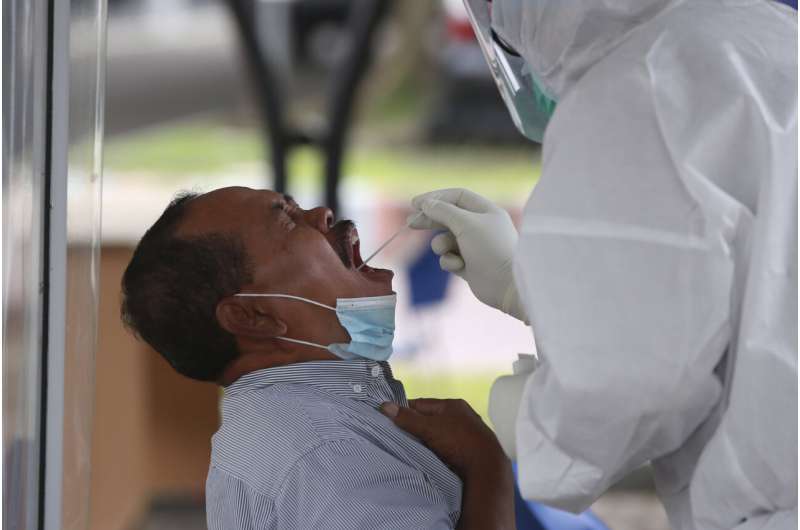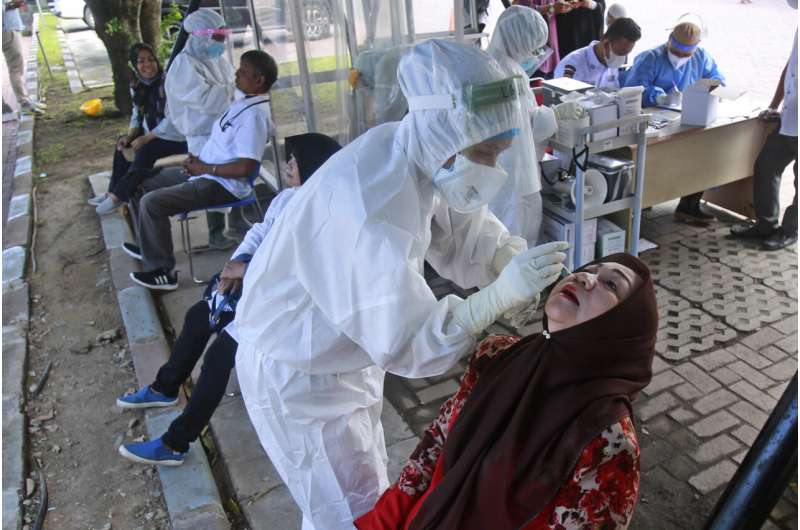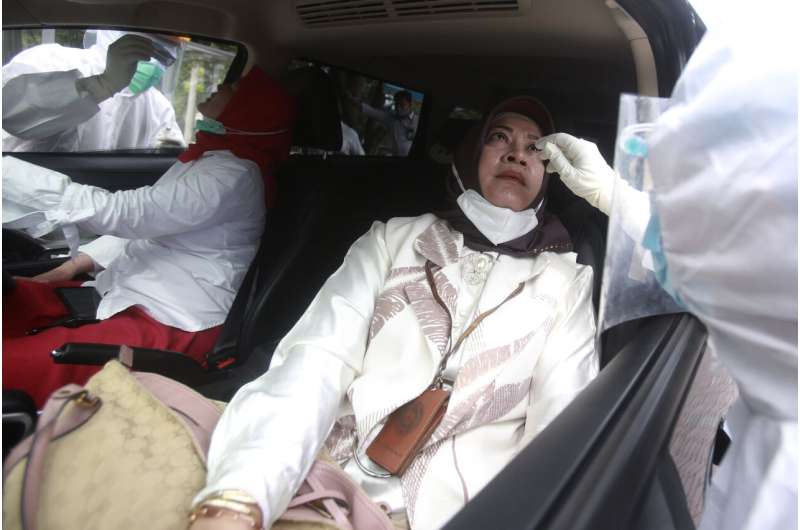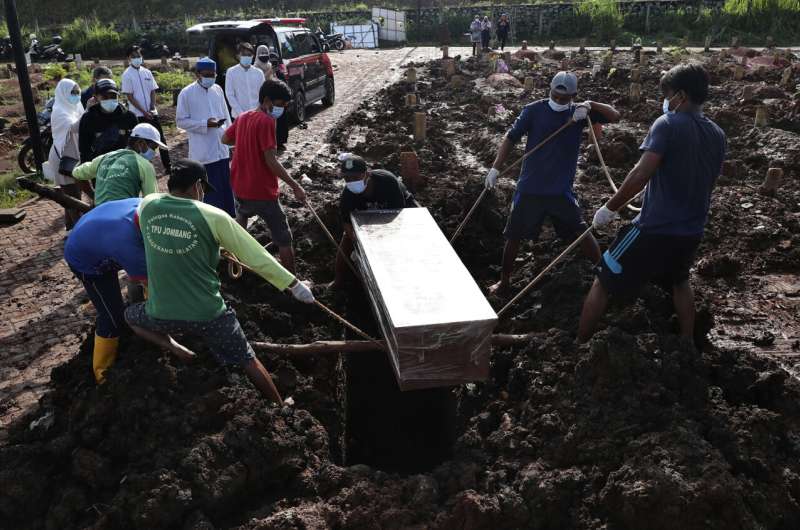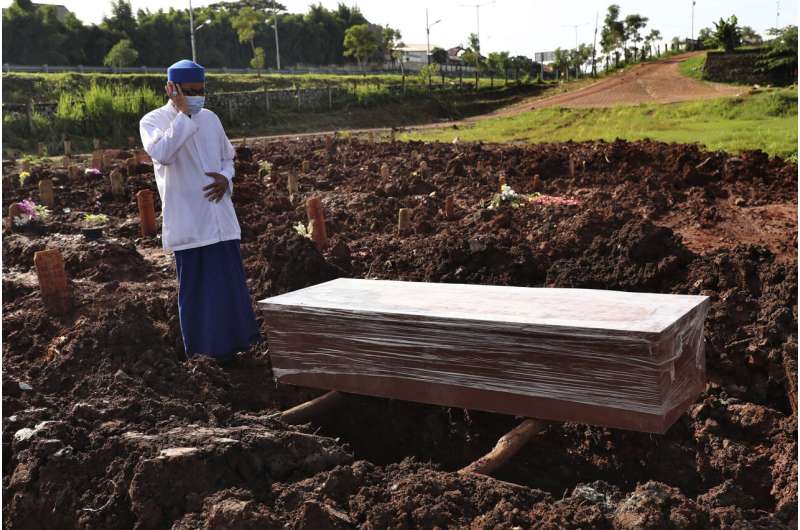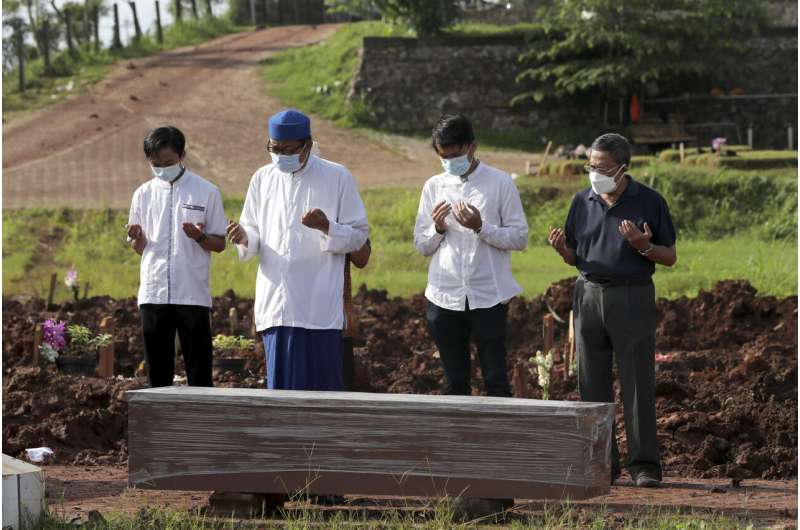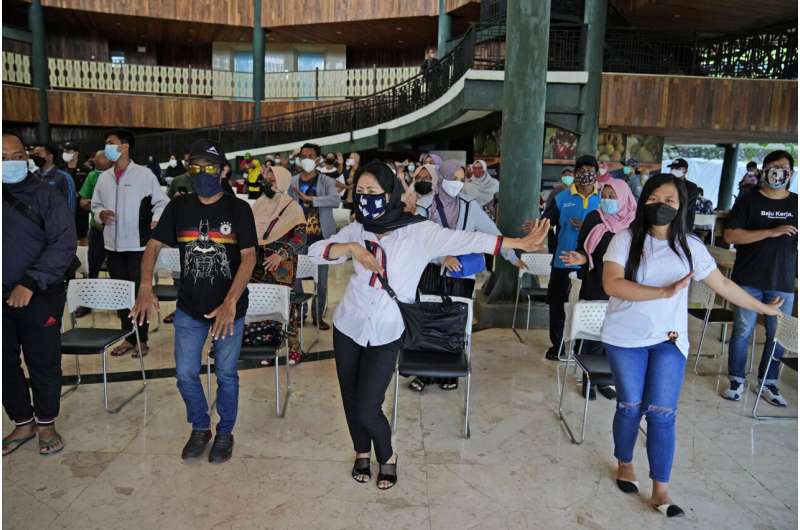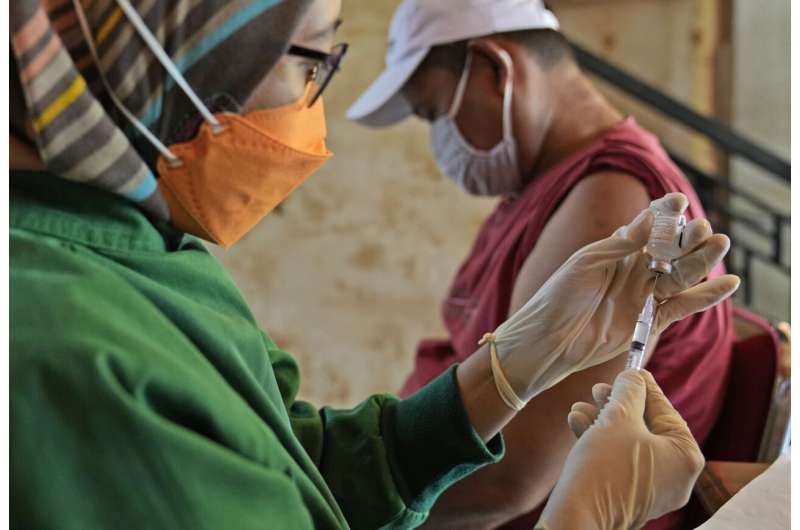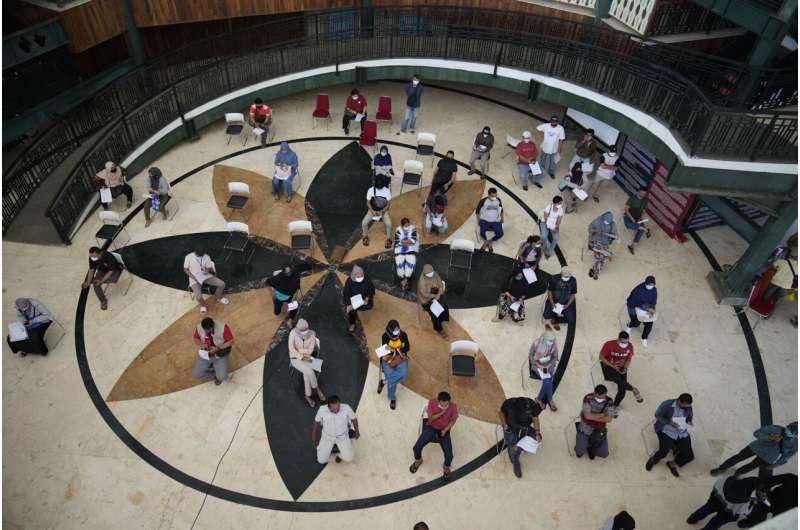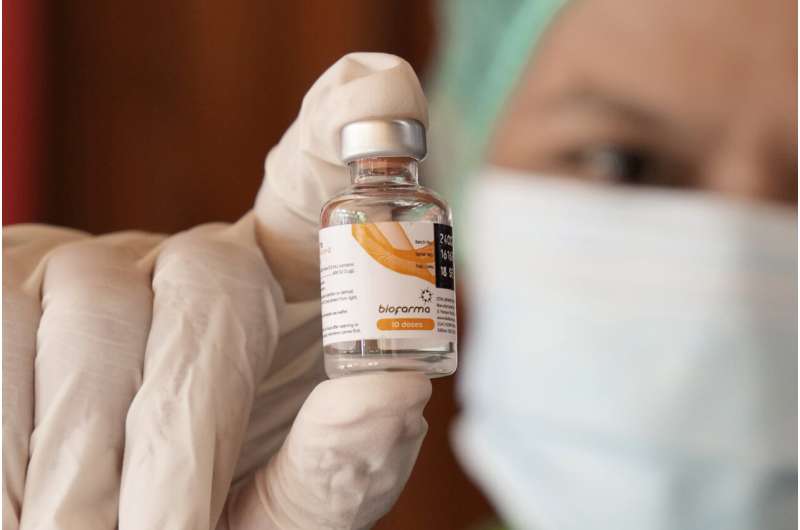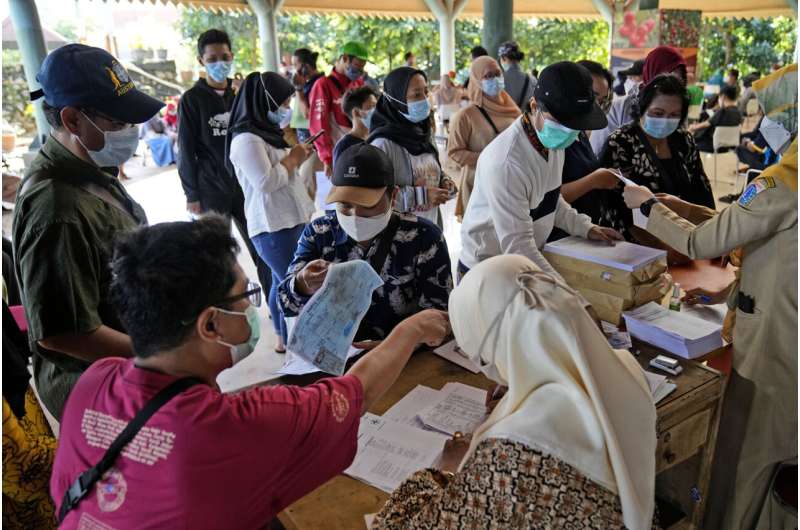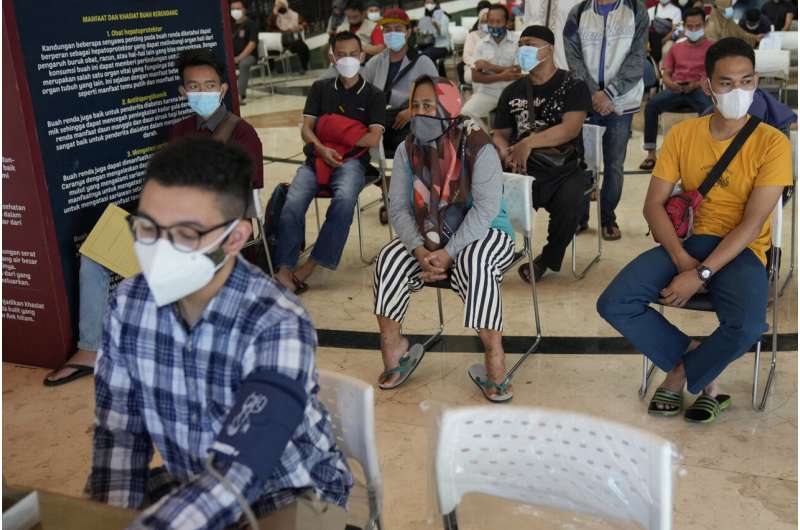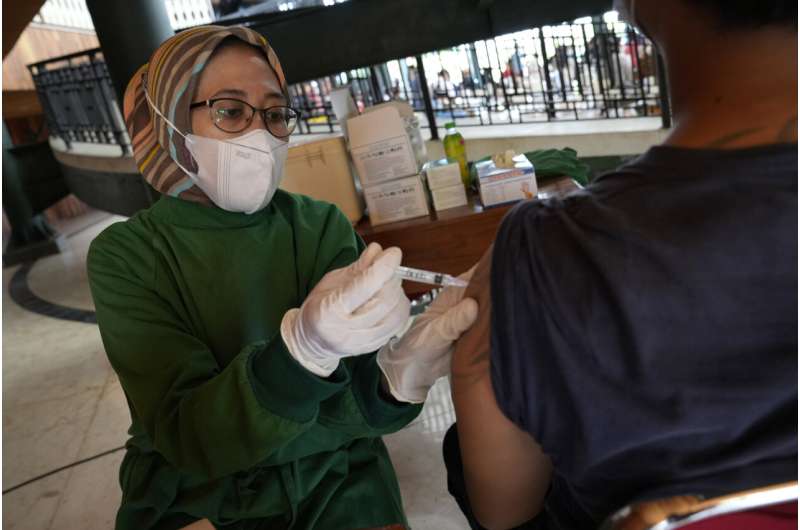A man reacts as a medical workers collect his nasal swab samples to be tested for coronavirus, during a COVID-19 screening at University of North Sumatra in Medan, Indonesia, Monday, June 21, 2021. Indonesia has reported more coronavirus cases than any other country in Southeast Asia. Credit: AP Photo/Binsar Bakkara
Indonesian health authorities announced the country's largest one-day jump in new coronavirus infections on Monday, as the number of confirmed cases since the pandemic began crossed 2 million.
The Health Ministry reported 14,536 new infections and 294 deaths, bringing the country's total confirmed fatalities to more than 54,950. Both the total cases and total deaths are the most in Southeast Asia.
Indonesia, the world's fourth most populous country, has seen infections surge in recent weeks, a climb that has been blamed on travel during last month's Eid al-Fitr holiday as well as the arrival of new virus variants, such as the the Delta version first found in India.
The surge is putting pressure on hospitals, including in Jakarta, where 80% of hospital beds are full, and has added urgency to the government's plan to inoculate 1 million people each day by next month. Authorities have so far only fully vaccinated 12.3 million of Indonesia's 270 million people and partially vaccinated another 10.9 million.
The World Health Organization last week said Indonesia's drastic increase in hospital bed occupancy rates is a major concern and necessitates stricter public health and social measures, including large-scale social restrictions.
A medical workers collect nasal swab samples from a woman to be tested for coronavirus during a COVID-19 screening at University of North Sumatra in Medan, Indonesia, Monday, June 21, 2021. Indonesia has reported more coronavirus cases than any other country in Southeast Asia. Credit: AP Photo/Binsar Bakkara
The government has resisted a large-scale lockdown due to fears of the economic impact. Offices, restaurants. shopping malls and places of worship remain open, though at 50% of their capacity.
"The situation is worrying," said Riris Andono Ahmad, an epidemiologist at Gajah Mada University. "We are facing a second wave of COVID-19 with the most transmissible variant and the public's low compliance with health protocols."
He urged stricter measures.
"All of the government's efforts and policy to curb COVID-19 transmission will be ineffective if it gives room for people to gather and crowd," he said.
The national COVID-19 task force said a spike in infections has been seen in Jakarta, Banten, West Java, Central Java, Yogyakarta and East Java provinces. All are on Java, the most populous of Indonesia's more than 17,000 islands.
-
Women have their nasal swab samples taken to be tested for the coronavirus, during a COVID-19 screening at University of North Sumatra in Medan, Indonesia, Monday, June 21, 2021. Indonesia has reported more coronavirus cases than any other country in Southeast Asia. Credit: AP Photo/Binsar Bakkara
-
Workers lower a coffin into a grave during a burial at the special section of Jombang Public Cemetery reserved for those who died of COVID-19, in Tangerang on the outskirts of Jakarta, Indonesia, Monday, June 21, 2021. Indonesia saw significant spikes in confirmed COVID-19 cases recently, an increase blamed on travel during last month's Eid al-Fitr holiday as well as the arrival of new virus variants, such as the the Delta version first found in India. Credit: AP Photo/Tatan Syuflana
-
An Islamic cleric recites the call of prayer during the burial of a man at the special section of Jombang Public Cemetery reserved for those who died of COVID-19, in Tangerang on the outskirts of Jakarta, Indonesia,Monday, June 21, 2021. Indonesia saw significant spikes in confirmed COVID-19 cases recently, an increase blamed on travel during last month's Eid al-Fitr holiday as well as the arrival of new virus variants, such as the the Delta version first found in India. Credit: AP Photo/Tatan Syuflana
-
An Islamic cleric leads relatives in prayer during the burial of a man in the special section of Jombang Public Cemetery reserved for those who died of COVID-19, in Tangerang on the outskirts of Jakarta, Indonesia, Monday, June 21, 2021. Indonesia saw significant spikes in confirmed COVID-19 cases recently, an increase blamed on travel during last month's Eid al-Fitr holiday as well as the arrival of new virus variants, such as the the Delta version first found in India. Credit: AP Photo/Tatan Syuflana
-
People dance to the music played by organizer while they wait to receive the Sinovac COVID-19 vaccine during a mass vaccination in Jakarta, Indonesia, Monday, June 21, 2021. Indonesia's president ordered authorities to speed up the country's vaccination campaign as the World Health Organization warned of the need to increase social restrictions in the country amid a fresh surge of coronavirus infections caused by worrisome variants. Credit: AP Photo/Dita Alangkara
-
A health worker prepares a shot of the Sinovac COVID-19 vaccine during a mass vaccination in Jakarta, Indonesia, Monday, June 21, 2021. Indonesia's president ordered authorities to speed up the country's vaccination campaign as the World Health Organization warned of the need to increase social restrictions in the country amid a fresh surge of coronavirus infections caused by worrisome variants. Credit: AP Photo/Dita Alangkara
-
People wait for health screenings required before they receive the Sinovac COVID-19 vaccine during a mass vaccination in Jakarta, Indonesia, Monday, June 21, 2021. Indonesia's president ordered authorities to speed up the country's vaccination campaign as the World Health Organization warned of the need to increase social restrictions in the country amid a fresh surge of coronavirus infections caused by worrisome variants. Credit: AP Photo/Dita Alangkara
-
A health worker shows a vial of the Sinovac COVID-19 vaccine manufactured by the Indonesian pharmaceutical company Biofarma, during a mass vaccination in Jakarta, Indonesia, Monday, June 21, 2021. Indonesia's president ordered authorities to speed up the country's vaccination campaign as the World Health Organization warned of the need to increase social restrictions in the country amid a fresh surge of coronavirus infections caused by worrisome variants. Credit: AP Photo/Dita Alangkara
-
People register to receive the COVID-19 vaccine during a mass vaccination in Jakarta, Indonesia, Monday, June 21, 2021. Indonesia's president ordered authorities to speed up the country's vaccination campaign as the World Health Organization warned of the need to increase social restrictions in the country amid a fresh surge of coronavirus infections caused by worrisome variants. Credit: AP Photo/Dita Alangkara
-
People wait for health screenings required before they receive the Sinovac vaccine for COVID-19 during a mass vaccination in Jakarta, Indonesia, Monday, June 21, 2021. Indonesia's president ordered authorities to speed up the country's vaccination campaign as the World Health Organization warned of the need to increase social restrictions in the country amid a fresh surge of coronavirus infections caused by worrisome variants. Credit: AP Photo/Dita Alangkara
-
A health worker gives a shot of the Sinovac COVID-19 vaccine to a man during a mass vaccination in Jakarta, Indonesia, Monday, June 21, 2021. Indonesia's president ordered authorities to speed up the country's vaccination campaign as the World Health Organization warned of the need to increase social restrictions in the country amid a fresh surge of coronavirus infections caused by worrisome variants. Credit: AP Photo/Dita Alangkara
President Joko Widodo last week ordered authorities to step up the vaccination rate.
The slow progress in immunizations so far can be attributed to the limited global supply of vaccines, the unpreparedness of the national health system and vaccine hesitancy, national COVID-19 task force spokesperson Wiku Adisasmito said.
The government has received 104.7 million vaccine doses, including 94.5 million of Sinovac, 8.2 million of AstraZeneca, and 2 million of Sinopharm. It expects to receive about 50 million Pfizer doses in the coming months, followed by 50 million Moderna doses.
Health Minister Budi Gunadi Sadikin has said deals to import around 104 million AstraZeneca doses have been hit by delays and now only 20 million doses are expected to arrive this year.
© 2021 The Associated Press. All rights reserved. This material may not be published, broadcast, rewritten or redistributed without permission.
